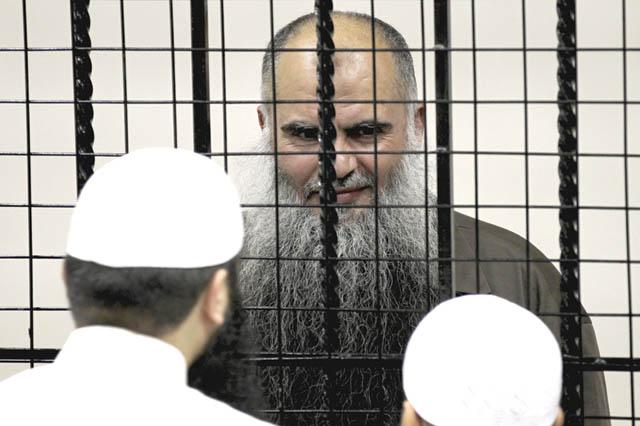You are here
Abu Qatada defence team fails to produce witnesses
By Taylor Luck - May 15,2014 - Last updated at May 15,2014
AMMAN — The defence team of hard-line cleric Mahmoud Othman, known as Abu Qatada, on Thursday failed to produce witnesses for the second time in less than a month as the State Security Court (SSC) urged the attorneys to prepare their final statements.
The defence team cited logistical and legal barriers as reasons for failing to produce witnesses in one of the trial’s final hearings.
In the so-called “reform and challenge” case, where the 51-year-old cleric is charged with masterminding Al Qaeda-inspired attacks on a host of sites across Amman in the late 1990s, attorney Hussien Mubaideen failed to produce a witness after the court refused his request to call Abu Qatada’s co-defendant Khader Abu Hosher to the stand for the second time.
Citing Article 148 of the Penal Code, the court, presided over by Ahmad Qatarneh, said the law prevents co-defendants from providing testimony on the same case.
Defence attorney Ghazi Thneibat, who is representing the Bethlehem-born Othman in the so-called “Millennium bombing” plot trial, also failed to produce a witness, claiming that the majority of those with ties to the case are “out of the country”.
Thneibat said he had intended to call to the stand Abdel Naser Al Khamaiseh, a fellow member of the hard-line Salafist movement who was previously jailed on terrorism charges and freed in a general pardon in 2011. He is believed to be currently serving alongside Islamist militias in southern Syria.
Qatarneh criticised the lawyers for being “unprepared” for Thursday’s session, turning down their request to extend the hearing period for defence witnesses.
The court ordered the cleric’s defence team to prepare their final statements for a session scheduled for May 29.
Abu Qatada, who faces up to life in prison with hard labour if convicted, remained calm throughout the session.
The British government deported Abu Qatada to Jordan in August 2013.
Despite entering a brief hunger strike in protest over access to wider prison facilities, the cleric has largely been “treated well” during his detention and has not suffered duress or torture, according to his family and defence attorneys.
Related Articles
The State Security Court heard the testimony of two audio recording experts as the defence team of Mahmoud Othman, or Abu Qatada, challenged the credibility of alleged phone threats made by the cleric while residing in the UK.
The State Security Court (SSC) postponed on Sunday the sentencing of hard-line cleric Abu Qatada as Al Qaeda-aligned preacher continued his war of words against the Islamic State (IS).
The State Security Court moved on Thursday to postpone the closing statements by the defence team of hard-line cleric Mahmoud Othman, known as Abu Qatada, to allow the translation of European and British court documents.

















